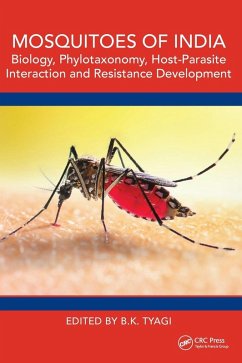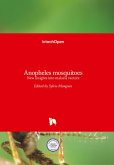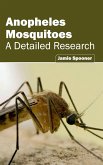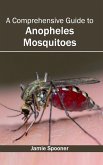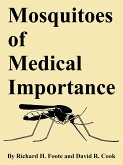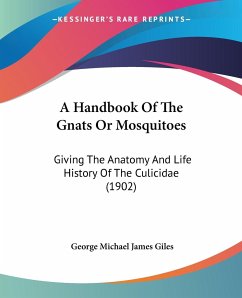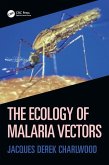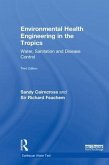Mosquitoes of India
Biology, Phylotaxonomy, Host-Parasite Interaction and Resistance Development
Herausgeber: Tyagi, B. K.
Mosquitoes of India
Biology, Phylotaxonomy, Host-Parasite Interaction and Resistance Development
Herausgeber: Tyagi, B. K.
- Gebundenes Buch
- Merkliste
- Auf die Merkliste
- Bewerten Bewerten
- Teilen
- Produkt teilen
- Produkterinnerung
- Produkterinnerung
This handbook presents information on Culicidae (Mosquitoes) and insecticide-based mechanisms of resistance development. A crucial reference source for mosquito-borne disease control and prevention, this book is meant for researchers, university students, medical entomologists, parasitologists, and public health professionals.
Andere Kunden interessierten sich auch für
![Anopheles mosquitoes Anopheles mosquitoes]() Anopheles mosquitoes127,99 €
Anopheles mosquitoes127,99 €![Anopheles Mosquitoes Anopheles Mosquitoes]() Anopheles Mosquitoes162,99 €
Anopheles Mosquitoes162,99 €![A Comprehensive Guide to Anopheles Mosquitoes A Comprehensive Guide to Anopheles Mosquitoes]() A Comprehensive Guide to Anopheles Mosquitoes183,99 €
A Comprehensive Guide to Anopheles Mosquitoes183,99 €![Mosquitoes of Medical Importance Mosquitoes of Medical Importance]() Richard H. FooteMosquitoes of Medical Importance35,99 €
Richard H. FooteMosquitoes of Medical Importance35,99 €![A Handbook Of The Gnats Or Mosquitoes A Handbook Of The Gnats Or Mosquitoes]() George Michael James GilesA Handbook Of The Gnats Or Mosquitoes48,99 €
George Michael James GilesA Handbook Of The Gnats Or Mosquitoes48,99 €![The Ecology of Malaria Vectors The Ecology of Malaria Vectors]() Jacques Derek CharlwoodThe Ecology of Malaria Vectors257,99 €
Jacques Derek CharlwoodThe Ecology of Malaria Vectors257,99 €![Environmental Health Engineering in the Tropics Environmental Health Engineering in the Tropics]() Sandy CairncrossEnvironmental Health Engineering in the Tropics197,99 €
Sandy CairncrossEnvironmental Health Engineering in the Tropics197,99 €-
-
-
This handbook presents information on Culicidae (Mosquitoes) and insecticide-based mechanisms of resistance development. A crucial reference source for mosquito-borne disease control and prevention, this book is meant for researchers, university students, medical entomologists, parasitologists, and public health professionals.
Hinweis: Dieser Artikel kann nur an eine deutsche Lieferadresse ausgeliefert werden.
Hinweis: Dieser Artikel kann nur an eine deutsche Lieferadresse ausgeliefert werden.
Produktdetails
- Produktdetails
- Verlag: Taylor & Francis Ltd
- Seitenzahl: 410
- Erscheinungstermin: 28. März 2025
- Englisch
- Abmessung: 254mm x 178mm
- ISBN-13: 9781032352244
- ISBN-10: 1032352248
- Artikelnr.: 71599122
- Herstellerkennzeichnung
- Libri GmbH
- Europaallee 1
- 36244 Bad Hersfeld
- gpsr@libri.de
- Verlag: Taylor & Francis Ltd
- Seitenzahl: 410
- Erscheinungstermin: 28. März 2025
- Englisch
- Abmessung: 254mm x 178mm
- ISBN-13: 9781032352244
- ISBN-10: 1032352248
- Artikelnr.: 71599122
- Herstellerkennzeichnung
- Libri GmbH
- Europaallee 1
- 36244 Bad Hersfeld
- gpsr@libri.de
Dr Brij Kishore Tyagi currently serves as the Professor of Practice, Department of Biosciences, University Institute of Biotechnology, Chandigarh University, Mohali (Punjab), India as well as the Advisor, Vellore Institute Technology, India, and the Consultant, Reckitt Benckiser, Gurugram (Haryana), India. He completed his MSc (Zoology) in 1974 and Ph.D. (Entomology/Zoology) in 1978. He joined the Malaria Research Centre (now National Institute of Malaria Research) in 1981 on a WHO-TDR research project on tribal malaria in south Gujarat, and subsequently the ICMR mainstream as Senior Research Officer at Vector Control Research Centre, Pondicherry in 1984, and as Assistant Director and later Deputy Director at Desert Medicine Research Centre, Jodhpur in 1988. He finally joined as a Scientist 'F' (Joint Director) (2000) and subsequently Scientist 'G' (Director) & Director-in-Charge (2005/07) at the Centre for Research in Medical Entomology, Madurai (Tamil Nadu State) through 35 years' long and highly distinguished career in diverse medico-entomological research, particularly the various vector-borne diseases (VBDs), in most of States and UTs in the country. He emerited from the ICMR Service in 2013, and was rewarded in continuity with two years; extension to 2015 with all administrative powers. Post-emeritation, he was appointed first as the Visiting Fellow followed by Visiting Professor at Bharathidasan Univ., Trichy (TN) (2015-2016) and subsequently as Visiting Professor at Punjabi Univ., Patiala (Punjab) (2017-2019). He has authored more than 700 scientific titles, 43 books, including a Training Manual, Biosafety for Human Health and the Environment in the Context of the Potential Use of Genetically Modified Mosquitoes (GMMs): A Tool for Biosafety Training based on courses in Africa, Asia and Latin America, 2008-2011, published by the World Health Organization (2015).
Foreword. Preface. Acknowledgment. About the Editor. List of Contributors
Chapter 1. History of Mosquito Research. Chapter 2. Phylogeny, Evolution
and Classification. Chapter 3. Biogeography. Chapter 4. Mosquito Inventory
of Extant Taxa, National Repositories, and Identification Keys for Dominant
Vector Species. Chapter 5. Mosquito Biodiversity. Chapter 6. Mosquitoes as
Vectors, Pests and Allergy Causers. Chapter 7. Mosquito Sampling: Theory
and Practice in India. Chapter 8. Biology of Mosquitoes. Chapter 9.
Ecology and Behaviour.Chapter 10. Mosquito Genomes. Chapter 11. Indian
Malarial Vectors: Tissue-Specific Molecular Complexity and Integrative
Biology. Chapter 12. Functional Gemomics Indian Malarial Vectors. Chapter
13. Oleuropein-Induced Autophagy: A Plausible Mechanism for Anti-Malarial
Drug Resistance. Chapter 14. Vector Dynamics Under the Impact of Climate
Change. Chapter 15. Insecticide Resistance. Chapter 16. Target Site
Mediated Insecticide Resistance in Major Mosquito Vectors. Chapter 17.
Effect of Insecticide Resistance on Biology and Reproductive Fitness of
Mosquito Vectors.
Index
Chapter 1. History of Mosquito Research. Chapter 2. Phylogeny, Evolution
and Classification. Chapter 3. Biogeography. Chapter 4. Mosquito Inventory
of Extant Taxa, National Repositories, and Identification Keys for Dominant
Vector Species. Chapter 5. Mosquito Biodiversity. Chapter 6. Mosquitoes as
Vectors, Pests and Allergy Causers. Chapter 7. Mosquito Sampling: Theory
and Practice in India. Chapter 8. Biology of Mosquitoes. Chapter 9.
Ecology and Behaviour.Chapter 10. Mosquito Genomes. Chapter 11. Indian
Malarial Vectors: Tissue-Specific Molecular Complexity and Integrative
Biology. Chapter 12. Functional Gemomics Indian Malarial Vectors. Chapter
13. Oleuropein-Induced Autophagy: A Plausible Mechanism for Anti-Malarial
Drug Resistance. Chapter 14. Vector Dynamics Under the Impact of Climate
Change. Chapter 15. Insecticide Resistance. Chapter 16. Target Site
Mediated Insecticide Resistance in Major Mosquito Vectors. Chapter 17.
Effect of Insecticide Resistance on Biology and Reproductive Fitness of
Mosquito Vectors.
Index
Foreword. Preface. Acknowledgment. About the Editor. List of Contributors
Chapter 1. History of Mosquito Research. Chapter 2. Phylogeny, Evolution
and Classification. Chapter 3. Biogeography. Chapter 4. Mosquito Inventory
of Extant Taxa, National Repositories, and Identification Keys for Dominant
Vector Species. Chapter 5. Mosquito Biodiversity. Chapter 6. Mosquitoes as
Vectors, Pests and Allergy Causers. Chapter 7. Mosquito Sampling: Theory
and Practice in India. Chapter 8. Biology of Mosquitoes. Chapter 9.
Ecology and Behaviour.Chapter 10. Mosquito Genomes. Chapter 11. Indian
Malarial Vectors: Tissue-Specific Molecular Complexity and Integrative
Biology. Chapter 12. Functional Gemomics Indian Malarial Vectors. Chapter
13. Oleuropein-Induced Autophagy: A Plausible Mechanism for Anti-Malarial
Drug Resistance. Chapter 14. Vector Dynamics Under the Impact of Climate
Change. Chapter 15. Insecticide Resistance. Chapter 16. Target Site
Mediated Insecticide Resistance in Major Mosquito Vectors. Chapter 17.
Effect of Insecticide Resistance on Biology and Reproductive Fitness of
Mosquito Vectors.
Index
Chapter 1. History of Mosquito Research. Chapter 2. Phylogeny, Evolution
and Classification. Chapter 3. Biogeography. Chapter 4. Mosquito Inventory
of Extant Taxa, National Repositories, and Identification Keys for Dominant
Vector Species. Chapter 5. Mosquito Biodiversity. Chapter 6. Mosquitoes as
Vectors, Pests and Allergy Causers. Chapter 7. Mosquito Sampling: Theory
and Practice in India. Chapter 8. Biology of Mosquitoes. Chapter 9.
Ecology and Behaviour.Chapter 10. Mosquito Genomes. Chapter 11. Indian
Malarial Vectors: Tissue-Specific Molecular Complexity and Integrative
Biology. Chapter 12. Functional Gemomics Indian Malarial Vectors. Chapter
13. Oleuropein-Induced Autophagy: A Plausible Mechanism for Anti-Malarial
Drug Resistance. Chapter 14. Vector Dynamics Under the Impact of Climate
Change. Chapter 15. Insecticide Resistance. Chapter 16. Target Site
Mediated Insecticide Resistance in Major Mosquito Vectors. Chapter 17.
Effect of Insecticide Resistance on Biology and Reproductive Fitness of
Mosquito Vectors.
Index

